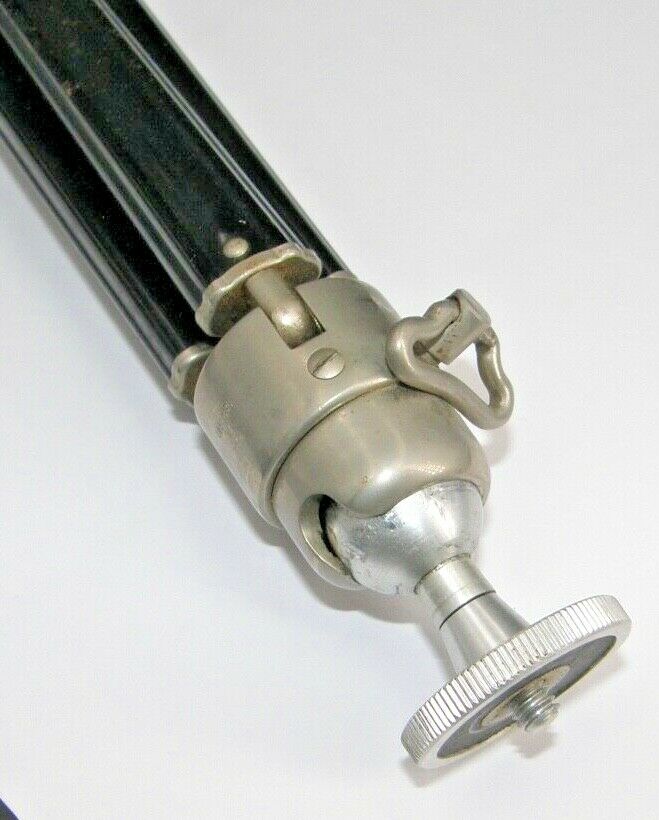=SOLD= 0029:: 1930s BILORA black camera tripod Made in Germany 17¼”H

0029:: 17¼”H BILORA black camera tripod Made in Germany (Since 1908)
“A technique made of plastic and metal”
Bilora Company Progression
1961
BILORA purchased their first plastic injection machine on July 26, 1961. It was the first step in recognized the benefits of this new technology. Previously plastics were looked upon as a cheap low quality material with little use other than the manufacture of toys etc. and no substitute for metal. The technological breakthrough recognized that lower cost, little or no post processing, finished surfaces and light weight, plus the elimination of many Assembly operations were just some of the advantages of the high grade plastic injection molding world BILORA had now entered.
The first machines were installed in the main plant “Plant 1”. This would remain so until 1977. The first parts manufactured from these machines were finished dish photo stands. Gradually, other metal parts were replaced by plastic parts resulting in high cost savings.
1965
The area of plastic processing is becoming increasingly important. There are soon 6 brand new machines in Plant 1, all of which are fully automated. Now it is becoming apparent not only in BILORA, that the use of plastic in many areas has big advantages. Without interfering with the camera or tripod manufacturing, BILORA begins to receive more and more orders for the plastic and metal-working side of their business. An ever increasing demand plus an intensive developed program of their own saw the Plastic Devision become a more and more important part of the comany.
1975
The production of cameras becomes uneconomical in the face of stiff competition from the far East and BILORA sadly ends the production.
It is now clear, that there is a stronger second arm to BILORA’s business and it is time to expand. First production will be moved into a rented unit.
Many local industries know of BILORA’s expertise in the field of plastic and their participation in design and development work with them. This leads to an ever expanding clientele from all over Germany and the Devision becomes more and more important.
1977
The long-overdue new “Plant 2” in the Mermbacher road starts in this year. Even the released space due to the ending of box-camera production, that was no longer sufficient to keep pace with the rapid development.
The new plant when completed with its impressive 16,000 m², delivers a modern plastic molding facility with production, warehouse and shipping. The offices, tripod manufacturing and machining Assembly department and Paint Shop Pro will remain in Plant 1. In January 1978, the new Hall would begin operations.
1978
In the following years, the contract manufacturing business was consistently expanded, although tripod manufacturing was still BILORA’s flagship.
1991
In 1991 it was decided to end Tripod manufacturing in Radevormwald. Competition from low-wage countries was too strong, along with the shrinking market due to constantly improving electronics in cameras, resulting in the introduction of the pocket camera, which had no need for a tripod. The production was awarded on license to a manufacturer in Tawan.
1992
The continued good performance of the contract production at the beginning of the 1990s resulted in a further need for even greater production capacity. It was decided to expand the Hall on the Mermbacher road by further 4,000 m² production area. The basement of this new building houses offers the Tooling department and tool storage space, allowing greater flexibility for this department to operate, having in the past had to share an Office floor. This phase of construction was completed in 1992.
Remained operations at the main Plant 1 at the Kaiserstrasse was for the Assembly, machining, packaging and storage areas of about 4,000 m².
1994
This year the two devisions of “Photo” and “Custom work” had developed to such an extent, that a distinction was necessary. Consequently the KUERBI OTTO TOENNES GmbH was founded to concentrate on the photo business, making the two companies independent of each other. The KUERBI & NIGGELOH BILORA GmbH devoted solely to the production of plastic items. Working at this time under one roof, but legally completely independently of each other. In 2007, once again a lack of space became a problem and the photographic section moved into new premises in Radevormwald.
1995
From the 1990s until today, the modernization and extension of the production has pushed ahead consistently. It has invested in modern production technology, built a modern quality assurance and certified. CAD jobs were created as well as CAD / CAM production at the molding tools. The by now 40 plastic injection molding machines (only of type “ARBURG”) have to a large extent automated peripherals robots and advanced controls. The raw material is being prepared centrally over hot air drying system with vacuum distribution.
2009
BILORA today offers its customers a complete service, ranging from design and development work, as well as advice on tool Manufacturing and maintenance through end product production up to additional services such as Assembly, die stamping and offset printing, and also a modern logistics, which is made possible by State of the art computing and software in all devisions.
2016
2016 – Kürbi & Niggeloh BILORA becomes BILORA Kundstofftechnik GmbH. The change of its name underlines the focus of the core business – tool making, plastic injection moulding and finishing.
The production capacity is increased by an Arburg 470C incl. extraction robot. In the area of tool manufacturing an investment is made in a CNC machining center. The work area is 1.000mm x 560mm x 600mm.
……………………………………………….
Dimensions: 17¼”H
Splay: 180 degrees
Germany 1930s c.H: 17¼"Reference number: 2020.0029 sold
Click here to print.
go back
